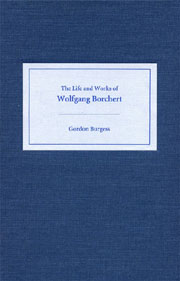Book contents
- Frontmatter
- Contents
- Acknowledgments
- List of Abbreviations
- Introduction
- 1 Childhood, School, Apprenticeship: 1921–1940
- 2 “The Happiest Time of My Life': January–June 1941
- 3 The Eastern Front and Courts-Martial: 1941–1943
- 4 Actor Turned Writer: Jena, Hamburg, and Basel: 1944–1947
- 5 The Poems
- 6 Draussen vor der Tür
- 7 The Short Stories
- 8 The Reception of Borchert's Life and Works
- Conclusion
- Published Works Cited
- Index
5 - The Poems
Published online by Cambridge University Press: 05 February 2013
- Frontmatter
- Contents
- Acknowledgments
- List of Abbreviations
- Introduction
- 1 Childhood, School, Apprenticeship: 1921–1940
- 2 “The Happiest Time of My Life': January–June 1941
- 3 The Eastern Front and Courts-Martial: 1941–1943
- 4 Actor Turned Writer: Jena, Hamburg, and Basel: 1944–1947
- 5 The Poems
- 6 Draussen vor der Tür
- 7 The Short Stories
- 8 The Reception of Borchert's Life and Works
- Conclusion
- Published Works Cited
- Index
Summary
Borchert's Modus Operandi
FROM HIS MID-TEENS until the end of his life, Wolfgang Borchert was an avid and critical reader of poetry. Indeed, three of the five reviews he wrote for the Hamburger Freie Presse and which were published in late 1946 and early 1947 were of collections of poems. From his midteens onward, he wrote verse himself, proud that some of his readers could detect traces of poets such as Shakespeare, Stefan George, or Rainer Maria Rilke in his own work. For a time, in 1940, he even signed his letters and poems “Wolff Maria Borchert” in honor of his favorite model for his own verse. In a letter written on Easter Monday 1941, he listed his favorite poets in two columns: Li-tai-pe, Verlaine, Sappho, Rilke, and Benn, followed by Baudelaire, Trakl, Hölderlin, Villon, and George. A little while later, after having been conscripted into the army, he wrote that he was “hungry” for art, naming Baudelaire, Rimbaud, Verlaine, Musset, Schiller, and Hölderlin.
His own verse during the years until the end of the war imitated, consciously or unconsciously, the poems of his models: Rühmkorf gives examples of work written in the style of Benn, Trakl, and Lichtenstein. Years later, as we have seen, he described to Aline Bussmann the way in which his verse was written — and, incidentally, the manner in which he was now writing his short stories — as the product of a surge of inspiration, rapidly committed to paper.
- Type
- Chapter
- Information
- The Life and Works of Wolfgang Borchert , pp. 136 - 150Publisher: Boydell & BrewerPrint publication year: 2003



